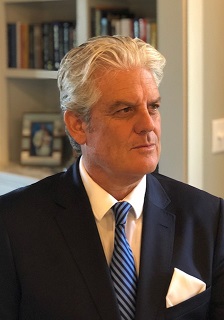From the CEO – August 2020

Dear Clients,
Political risk entered a new but quite familiar phase more fully last week as US Fed Chairman Powell signaled a significant (but largely expected) change to the country’s monetary policy, suggesting that interest rates would stay low for some time, opting to allow employment gains in the face of the impact of C19. Powell mentioned that the Fed would target inflation at an ‘average’ of 2% and would not raise rates necessarily if unemployment numbers in the US eased.
Emerging market assets popped on the news, aided by higher growth numbers coming from China’s services sector. But scant mention of yield curve control raised concerns about rising nominal yields, which put some pressure on emerging market bonds.
In any case, a weaker greenback for the next little while is a positive for emerging and frontier markets generally, especially those with relatively good risk profiles, and export markets that tend to do well under these conditions. Emerging market currencies, which have not fared well so far this year, should improve over the short-term, but we caution over-enthusiasm on the carry trade as rising C19 cases will do little to boost investor sentiment and thus keep risk premia intact for the moment.
It should be noted that a weaker greenback will cause some inflationary pressures in many emerging market countries. Commodities will become more valuable, suggesting the quest for economic rent will intensify, particularly in light of the funding needs of countries running high fiscal and current account imbalances, as well as significant external debt to GDP loads.
Much of this we saw a decade ago when the USD experienced a similar trajectory against a number of currencies and commodity prices (including gold and silver). Coupled with rising joblessness among the youth (particularly in the Middle East) and unresponsive political regimes, the impetus underlying the Arab Spring began to gather momentum. Watch our ICRG ratings going forward, especially those related to ‘Government Stability,” ‘Socioeconomic Conditions,’ ‘Internal Conflict,’ and ‘Democratic Accountability.’ They will signal important shifts in a country’s risk profile. A quote by JFK seems most apt at this stage: ‘History is a relentless master. It has no present, only the past rushing into the future.’
Turning to the ratings for the month, a number of highlights are worth mentioning. In the Americas, Canada seems to be in a bit of a funk as the Trudeau government lost its finance minister over the current and latest scandal engulfing Ottawa at the moment, and as the PM decided to suspend parliament for the next little while. There are some clear political machinations going on, and with the election of a new opposition leader, Trudeau is beginning to feel the heat, especially as his governing Liberals only have a minority presence in parliament.
In Guyana, the election impasse was finally resolved, although the opposition has said it will file a motion with the country’s judiciary, challenging the outcome. Despite this, much of the uncertainty surrounding the development of the country’s large offshore petroleum fields should ease.
In Europe, the approval rating of France’s Macron has risen to 50% recently, largely on the back of the signing of the EU stimulus bill. The jobless rate has fallen since the beginning of the pandemic, but C19 cases have risen ‘exponentially.’ Protests continue in Belarus following the flawed re-election of President Lukashenko. Multilateral sanctions are being formulated at the moment. Close economic ties with Russia suggests the next move by the Kremlin will be key in how the conflict plays out. Similar protests are continuing in Bulgaria, and political change is in the air.
A military coup in Mali made international headlines in August, although our political risk ratings on the country crept into the ‘Very High Risk’ category in June, 2019, so there was little surprise to our clients. With elections soon in Cote d’Ivoire and Burkina Faso – and some of the similarities between these countries – there is little doubt that a peaceful run-up to these elections can be expected.
In Asia, the Rajapaksa family scored a huge win in recent elections in Sri Lanka, which now allows them significant control over the executive and legislative arms of the government. The new power configuration will allow for some constitutional changes that will centralize power, as the economy contracts some 6% in 2020. And Japan’s prime minister, Shinzo Abe, announced his resignation from the post for health reasons. The famed “Abenomics’ is likely to remain in place, but there should be some short-term uncertainty as it affects regional stability as a new political configuration takes hold.
Finally, Turkey’s conflict with Greece over parts of the Mediterranean is heating up, although Turkey’s economy did not contract as much as expected during the initial phase of the C19 lockdown. A $33 billion stimulus package helped considerably, and we are monitoring inflationary pressures in the country.
According to our risk models, we remain bullish on the following currency pairs: CAD/USD, GBP/USD, and EUR/USD, as well as on select emerging markets, particularly those with relatively low levels of external debt/financing costs, and with commodity driven economies.
August was again a very impressive month for new and returning clients. On the former, we would like to welcome Arab Academy for Science and Technology, Portland State University, Indiana University, Victoria University, Universidade Federal do Espirito Santo, Gumushane Universitesi and the IESEG School of Management. On the latter, we want to welcome back Jones Lang LaSalle, Banco Central del Paraguay, JLT, Oesterreichische Nationalbank, Credendo Export Credit Agency, Emory University, Williams College, Penn State University, Second Swedish National Pension Fund, Fifth Third Bank and PIMCO, among others. Thank you so much for your continued support for the best quant-driven geopolitical risk rating and forecasting data anywhere!
Quid Periculum: Managing Political Risk in an Age of Uncertainty, co-authored and co-edited by Peter Marber (Harvard/Aperture Investors) and me, is slated for a September-October release. The book, which features chapters by some of the leading authorities in academe and the financial community, is now available for pre-order. Contact Louis Carroll, PRS’ Director of Business Development, for more information. (lcarroll@prsgroup.com)
PRS’ partnership with Toggle – an AI-based trading and portfolio management platform, backed by some of the largest Family Offices in the US – continues to flourish. Our data will soon be available on Interactive Brokers and all major trading platforms. We are very happy with our relationship with Toggle, as their professionalism and unique insights further underscore the future of geopolitical risk.
We are also in early-stage discussions with the data analytics departments from several of our academic clients in the US, with the aim of providing the most comprehensive, AI-generated data on geopolitical risk available anywhere. The initiative complements our work with Toggle as it affects geopolitical risk and actionable trades and portfolio management. Stay tuned for more details in the months to come.
Our ICRG data series continues to be the gold standard among the world’s leading academic researchers and multilateral organizations. In the IMF’s recent External Sector Report, 2020, a side note was included in the commentary that mentioned economies with better perceived institutional quality (viz., stronger economic and financial fundamentals) – as measured by ICRG – experienced smaller currency depreciations when the VIX is high. (https://lnkd.in/dSKWm77)
Moreover, a groundbreaking and timely study by Barry Eichengreen and others questioned the nature of the political legacy the COVID-19 pandemic, particularly during an individual’s “impressionable years” (ages 18-25). Using ICRG risk data in large measure, the authors found negative effects on confidence in political leadership and institutions associated with healthcare-related policies at the time of the epidemic. Weak governments and institutions were especially vulnerable to the sentiment, suggesting that the pandemic could have a long-lasting political scar on younger people, those of Generation Z. (https://www.nber.org/papers/w27401)

Chief Executive

PRS INSIGHTS
Moving beyond current opinions, a seasoned look into the most pressing issues affecting geopolitical risk today.
EXPLORE INSIGHTS SUBSCRIBE TO INSIGHTS
